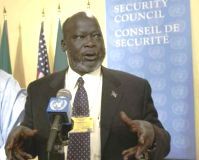Sudan rebels ask US for immediate help
By LIZ SIDOTI, Associated Press Writer
RUMBEK, Sudan, Apr 15, 2005 (AP) — The leader of resistance during Sudan’s civil war asked the United States on Friday for immediate help – and $30 million – to start rebuilding the African country’s resource-rich south, which was devastated by two decades of fighting.

|
|
John Garang, head of the main Sudanese rebel group, speaks after the United Nations Security Council met in New York to discuss the situation in the Darfur, February 8, 2005. (Reuters). |
John Garang, head of the rebels who challenged the Khartoum-based government, pressed Deputy Secretary of State Robert Zoellick for aid to build roads, schools and communication systems as well as modernize the southern military.
“His key message actually was infrastructure,” Zoellick told reporters, “the basics to build the region.”
The United States has pledged $1.7 billion for Sudan’s recovery, with much of the aid slated to ease the humanitarian crisis and begin reconstruction of the south. Congress has approved about half that amount. A request for the rest is pending. But it takes time for the dollars to flow out of Washington.
“He’s got things he wants now,” Zoellick said, calling Garang shrewd.
The State Department’s No. 2 official met with Garang to urge quick action on the peace deal southern rebels reached with the Khartoum-based government in January. It ended a two-decade old war and set up a process for the south to choose autonomy in six years.
Between now and then, the agreement allows the south to maintain separate forces in addition to a joint military formed by merging the government’s troops with the south’s Sudan People’s Liberation Army.
In an effort to get Garang to the table to negotiate peace, the United States had told the rebel leader it would help restructure the southern forces, which currently are scattered across the region.
State Department officials say a Pentagon team plans to arrive within the next few weeks to assess how the military can be modernized. They say the United States won’t provide weapons but that it has committed $20 million to the effort to centralize forces.
Garang made his pitch for more aid while talking privately with Zoellick inside a tin-roofed brick compound nestled among the town’s huts of sticks, mud and grass.
When Zoellick’s plane landed on a red dirt strip in the tree-dotted savanna, he was met by several hundred townspeople gathered on a muggy morning. A marching band played, an army unit stood at attention, women and children in colorful robes sang and danced. One sign read, in English, “Train us PLA to defeat fundamentalism and terrorism.”
A day earlier Zoellick had met with Ali Osman Mohammed Taha, Sudan’s first vice president, in the capital city. During meetings with both men, Zoellick pressed for peace in Sudan’s troubled Darfur region.
In February, Taha and Garang called to an immediate end to fighting in Darfur and resumption of peace talks in hopes of ending the conflict this year .
Later Friday Zoellick was traveling to the Abu-Shouk camp for some 80,000 refugees outside El Fasher in the Darfur region.
The number of dead in Darfur has grown to 180,000, many of them casualties of disease and famine, and 2 million people are homeless.
Zoellick pressed for action during meetings with Taha and other top government officials. “The responses that I’ve been given are good responses,” Zoellick said, “but this has been a problem that left tens of thousands of people dying so we have to solve the problem.”
In an apparent sign of the government’s willingness do that, Foreign Minister Mustafa Osman Ismail gave Zoellick an outline of proposals to reach peace.
The United States has looked to Khartoum to curtail attacks by the government-aligned Arab militias that launched a counterinsurgency in 2003 when ethnic Africans rebelled over what they called discrimination by the Arab-dominated government.
Known as the Janjaweed, the militias have committed wide-scale abuses against tribes they say are allied with the rebels.
